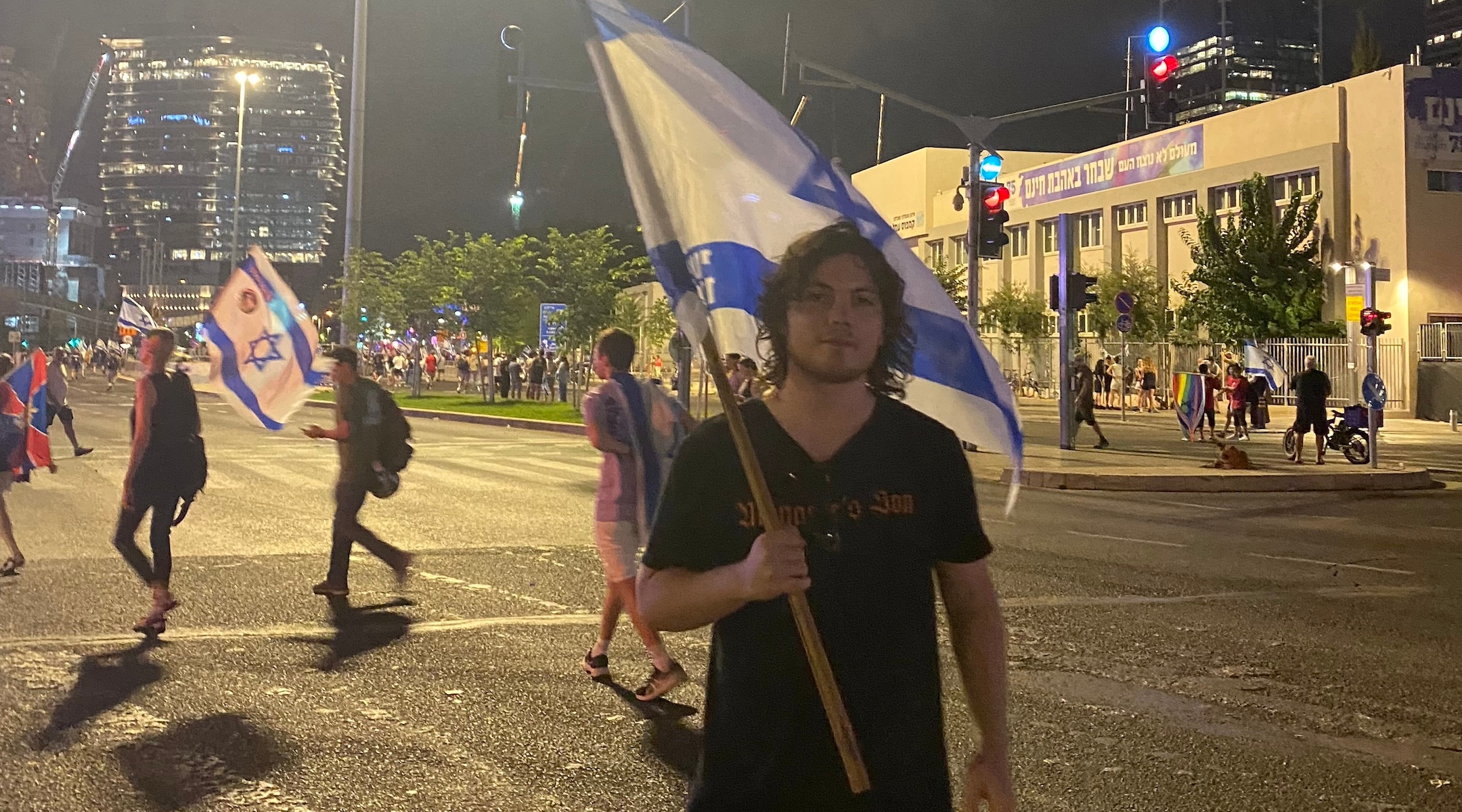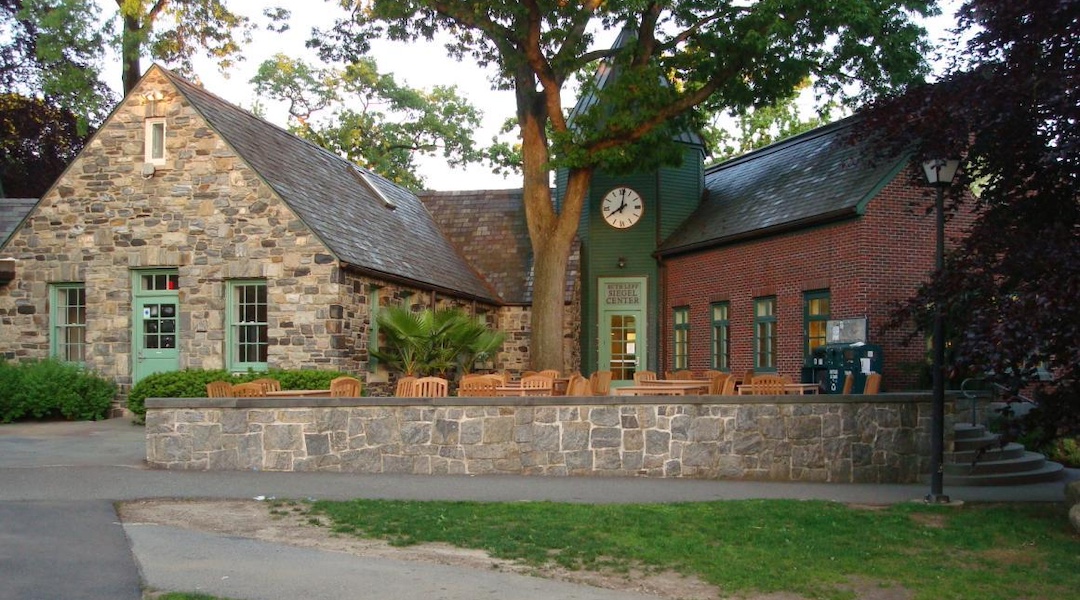Jeff Tweedy’s son became a ‘pariah’ on his college campus after speaking up for Israel
“As long as you’re not willing to call for the destruction of the State of Israel… you’re in for some trouble as a Jewish young person or college student,” said the son of the Wilco songwriter

Sammy Tweedy participated in the mass protests against Israel’s judicial reform over the summer. (Courtesy of Tweedy)
(JTA) — One big turning point in Sammy Tweedy’s Jewish story took place when he was preparing for his bar mitzvah, and his rock star father, Wilco frontman Jeff Tweedy, converted to Judaism as part of the process.
Another occurred in 2020 when he was a sophomore in college and accepted a free Birthright trip to Israel — triggering an avalanche of criticism from his classmates at Sarah Lawrence College just outside of New York City.
“It was just like, I had done something very wrong by going to Israel, which I found to be very hypocritical,” Tweedy recalled to the Jewish Telegraphic Agency last week. “Because nobody asked me, ‘Hey, what’s your opinion on this?’ I would have even been OK with someone saying ‘Hey, how do you justify going to Israel?’ because I would have justified it to them.”
Three years later, Tweedy has withdrawn from Sarah Lawrence, vowing never again to return to campus, in part because of the anti-Israel and antisemitic vitriol he said he has experienced there. As a group serving Jewish students in the region raises the alarm about the climate at Sarah Lawrence, Tweedy has become an unlikely standard-bearer in the movement to fight antisemitism on college campuses. He recently appeared in a New York Times article on the topic.
In particular, Tweedy represents what advocates say is a persistent and disquieting trend, made only more intense since Hamas’ Oct. 7 attack on Israel, of liberal Jewish students who do not oppose Israel being made to feel unwelcome in progressive groups and spaces.
“As long as you’re not willing to call for the destruction of the State of Israel and the expulsion or murder of the inhabitants of the State of Israel, you’re in for some trouble as a Jewish young person or college student,” he said.
“I just realized I might as well just be the one person in these environments, in these classrooms, presenting an opinion that is somewhat more sympathetic to Israel,” Tweedy said, adding that he is not a fan of Israel’s right-wing government and its main party. “Like, I’m not a Likudnik … but I think that people misunderstand fundamentally why Jewish people are there.”
Growing up in Chicago — whose iconic Marina City skyscrapers feature on the cover of Wilco’s “Yankee Hotel Foxtrot” album — Sammy Tweedy attended the Reform Congregation Emanuel synagogue. He and his brother both celebrated their bar mitzvahs there, but he said he sometimes bristled at the messaging he heard about Israel at synagogue and in other Jewish spaces, recalling that he felt the need to constantly “deprogram” himself.
“There’s … pro-current Israeli government policy propaganda that, you know, you are exposed to as a Jewish young person in America,” he said.
“I was given (at worst) unquestioning perspectives on Israel and (more commonly) just consensus without question that Israel should exist,” he added in a text message. “Which I agree with. But at summer camp and synagogue, those were just Zionist spaces.”
Some young adults who say they were handed a one-sided perspective on Israel have gotten involved in criticizing the country from a Jewish point of view. IfNotNow, for example, was founded in 2014 by graduates of Jewish day schools and summer camps to oppose Israel’s occupation of the West Bank and its war on Gaza at the time.
Tweedy went a different direction. After his Birthright trip, he enrolled in history classes about the Israeli-Palestinian conflict and found himself defending Israel. When students in class argued that “the Jewish connection to the land of Israel is completely fabricated,” he would speak up, offering historical perspective about the Jewish history in the region that dates back to biblical times. He says he was soon labeled a “racist” around campus.
“I was like, ‘What did I say that was racist? Why are they saying that?’ It’s because ‘you said Jewish people are indigenous to Israel.’ And I was like, that’s not f—ing racist. That doesn’t mean that Palestinians shouldn’t be able to live in that land or call it Palestine or whatever,” he said.
Tweedy also felt dismayed when the school’s Students for Justice in Palestine chapter endorsed “armed struggle” against Israel and honored Khaire Alkam — who shot and killed seven Israelis at a synagogue — on a “wall of martyrs” in a campus building shortly after the attack this past January.
As word got around about his views, Tweedy was hit with a wave of social media messages from fellow students calling him out. Since Hamas’ attacks on Israel on Oct. 7 and Israel’s subsequent war in Gaza, the barrage increased. One post shared with the Jewish Telegraphic Agency read “the blood of gaza is on your hands.” In another, a student admitted to harassing him. He sometimes joined in arguments, as shown in messages he shared with JTA.
He filed a bias incident report to administrators on Nov. 11, after he saw the campus SJP charter say in an online post that U.S. media is “controlled by Zionists.” He said the school determined that the use of the word “Zionist” made the post acceptable.
A Sarah Lawrence spokesperson told JTA that the school does not share information on students with the media.
But Tweedy is far from the first Jewish Sarah Lawrence student to complain about the school’s handling of reported antisemitic incidents. On Oct. 31, Hillels of Westchester — representing chapters at Sarah Lawrence and a handful of other nearby schools — sent a letter to Sarah Lawrence President Cristle Collins Judd alleging that since at least 2014, Jewish students have been “harassed, intimidated, bullied, and ‘canceled’ for simply expressing themselves as Jews, or discussing or identifying with Israel.”
The group added in their letter that Briana Martin, the school’s diversity, equity and inclusion director, sent a message to student groups after Oct. 7 that did not mention Israeli deaths. “We are aware of the ongoing conflict happening with Palestine, including the most recent events that happened over the weekend,” she wrote. “It is disheartening and tragic, and we know many are deeply impacted by this.” She also promoted an “Hour of Solidarity with Palestine” event organized by SJP.
“Since Saturday October 7th, our focus has been, first and foremost, on the welfare and education of all our students and it remains so,” the Sarah Lawrence spokesperson said in a statement to JTA.
“We are deeply disappointed that, at such a challenging time, misleading claims are circulating, serving to fuel the information wars that have clouded the news these past several weeks,” the statement continued. “We are actively engaged in direct conversations with students from our various Jewish student organizations, and have responded individually and collectively to concerns shared with us by students and families.”
In responding to the Hillel group’s first letter, Judd pointed to the college’s current renovation of the school’s Ruth Leff Siegel Center, which will “support cultural and spiritual student communities.” But she also rejected the group’s involvement in campus affairs.
“Hillels of Westchester has no official relationship with the College, nor do you speak in any official capacity for our students,” Judd added.

A view of the Ruth Leff Siegel Student Center at Sarah Lawrence College. (SaidieLou/Wikimedia Commons)
Now, Hillels of Westchester Co-President Sheila Rennert said the group is in the “evidence-gathering phase” of a potential Title VI lawsuit against the school, alleging that the college has not followed through on its federal legal obligations to keep Jewish students safe.
Any redress through a future lawsuit won’t affect Tweedy directly. The history and music major left to study abroad at Tel Aviv University in August, joining in the mass protests against the Israeli government’s controversial plans to overhaul its judicial system and enjoying the city’s “secular nightlife.”
“I just felt very attached to that vision of Israel, and preserving that sort of modern, more tolerant idea of what Israel could mean, and I was having a really great time there,” he said.
With Israeli universities on hiatus because of the war, he left Israel shortly after Oct. 7 and has been staying with his girlfriend in Florida, where he is finishing up his last semester of classes remotely.
He said he won’t step foot on Sarah Lawrence’s campus ever again.
“The feeling of being a pariah was so intense that I developed these stomach problems that just made life really difficult, and I think they went away since leaving. So just literally for my health I can’t go back there,” he said. “But I’m going to transfer credits and graduate from there and say goodbye and never donate a cent and tell everyone I know to avoid the school at all costs.”
Tweedy wouldn’t share his father’s views on Israel, but he said everyone in the family has their own perspective. His older brother Spencer recently published a post on Substack criticizing “Jewish supremacy” in Israeli governance and calling for a ceasefire in the current war, which Israel and its allies say would allow Hamas to remain in power.
“I’m probably the most vocally pro-Israel, pro-normalizing the existence of Israel so that we can actually work to end this conflict,” Sammy Tweedy said about his family. “But I think we all are united by this idea that you can’t delegitimize the existence of one people or another and expect that to lead to any bettering of the situation.”
After college, Tweedy wants to be a musician like his dad; he and Spencer have both played on some of their father’s solo records. But he also wants to do something that has a concrete impact: He’s considered writing about the Israeli-Palestinian conflict and applying to work for organizations that aim to build peace.
“I care about the region. And I want people to stop killing each other,” he said.
This article originally appeared on JTA.org.
















